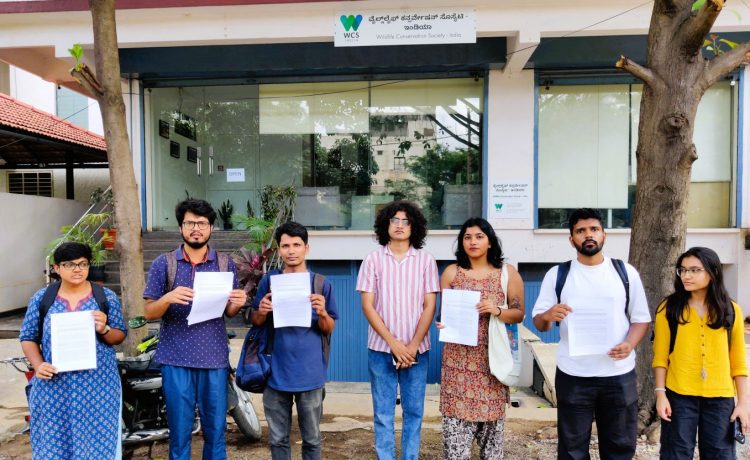“This Isn’t Conservation, It’s Colonization”, say Student Activists: Outrage Grows as Adivasi Families Forcibly Evicted from Nagarahole Tiger Reserve
Bengaluru | 17 July 2025: Under the relentless monsoon rains, 52 Jenu Kuruba Adivasi families watched as their homes in Nagarahole Tiger Reserve were reduced to rubble. Now, their plight has ignited a firestorm of protest, with student activists in Bengaluru leading a powerful condemnation of what they call “violent conservation”—a brutal displacement of indigenous communities in the name of wildlife protection.
On Wednesday, demonstrators from the Community Network Against Protected Areas (CNAPA) staged a symbolic protest, slamming the June 18 eviction in Karadikallu, where forest officials—backed by over 250 armed personnel, including the Tiger Task Force—demolished six huts, leaving families homeless during the heaviest rains of the season.
“They Call Us Encroachers on Land Our Ancestors Protected”
The evicted families had returned to their ancestral land in May 2025, asserting their rights under the Forest Rights Act (FRA) 2006, which recognizes historical injustices against Adivasis. Instead of justice, they faced bulldozers, surveillance, and criminalization.
“This isn’t conservation, it’s colonization,” said Laxmi, a student protester. “They are evicting people who have lived here for generations while allowing luxury resorts and monoculture plantations to take over the same forests.”
Activists argue that militarized conservation, backed by organizations like the Wildlife Conservation Society (WCS) and figures such as Ullas Karanth, has turned forests into battlegrounds—displacing indigenous communities, replacing biodiversity with teak plantations, and prioritizing tourism over tribal rights.
“It’s shocking that in 2025, armed forces are still destroying tribal homes,” said Anu, a CNAPA activist. “They used Adivasi knowledge to map these forests, and now they call them ‘encroachers’.”
Six Demands for Justice
CNAPA and allied groups have laid out urgent demands:
-
Withdrawal of armed forces from forest areas.
-
Recognition of forest rights under the FRA.
-
Implementation of the PESA Act for tribal self-governance.
-
Appointment of members to the SC/ST Commission.
-
Adivasi-led conservation models instead of forced evictions.
-
Unrestricted media access to Nagarahole to report on ground realities.
“The Forest Needs Its People, Not Their Erasure”
As evicted families shelter under flimsy tarps, battling the monsoon, protesters stress that this fight is not just about land—but survival, dignity, and constitutional justice.
“Adivasis are not intruders—they are the forest’s first guardians,” said Laxmi. “If conservation means destroying lives, then whose future are we really protecting?”
The question now echoes beyond Nagarahole: How long will India’s indigenous communities pay the price for ‘conservation’ that excludes them?
Impactful Quotes for Social Media & Reports:
-
“This isn’t conservation—it’s colonization. They displace Adivasis but welcome resorts and plantations.” – Laxmi, student protester
-
“Shocking that in 2025, armed forces still destroy tribal homes while calling them ‘illegal’.” – Anu, CNAPA activist
-
“The forest needs its people, not their erasure. Adivasis are its first guardians, not threats.” – Aratrika, student volunteer
-
“They used tribal knowledge to map these forests. Now they criminalize the same people.” – Junaid, CNAPA activist
-
“If conservation means destroying lives, whose future are we really protecting?” – Protest banner
![]()











